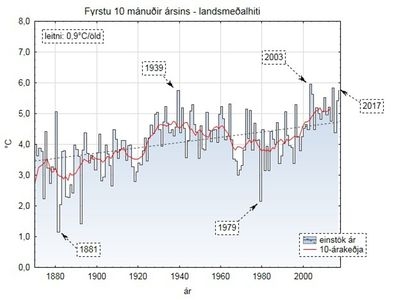The weather forecast for Sunday might include some scattered snow in the South West Iceland, bringing the first real taste of winter to Reykjavík. In fact the past month was one of the warmest on record in Iceland: October 2017 was the eight warmest since systematic measurements began in 1870.
2017 could beat temperature records

Meteorologist Trausti Jónsson, one of the most trusted weathermen and meteorologists in Iceland, who maintains a popular climate and weather blog Hungurdiskar, has published temperature figures for October and the first ten months of the year. Trausti points out that 2017 could easily become the warmest year on record.
Read more: 2016 shattered temperature records in Iceland. Hottest year on record in the Westfjords
Trausti shows that the average temperature in Iceland during the first ten months of 2017 is already the third highest since 1870. The previous records were set in 1939, during a period of unusually high temperatures in Iceland, and then in 2003.
For 2017 to become the hottest on record the average temperature in November and December must be a total of 1.3°C higher than average. Trausti points out that based on the experience of past years this could quite possibly happen.
If November and December do in fact set new heat records we might have to wait until January or even February to get a real taste of winter here in Reykjavík. We at Iceland Insider are crossing our fingers, hoping that winter descends upon us in time for us to get some decent Christmas snow!

The weather forecast for Sunday might include some scattered snow in the South West Iceland, bringing the first real taste of winter to Reykjavík. In fact the past month was one of the warmest on record in Iceland: October 2017 was the eight warmest since systematic measurements began in 1870.
2017 could beat temperature records

Meteorologist Trausti Jónsson, one of the most trusted weathermen and meteorologists in Iceland, who maintains a popular climate and weather blog Hungurdiskar, has published temperature figures for October and the first ten months of the year. Trausti points out that 2017 could easily become the warmest year on record.
Read more: 2016 shattered temperature records in Iceland. Hottest year on record in the Westfjords
Trausti shows that the average temperature in Iceland during the first ten months of 2017 is already the third highest since 1870. The previous records were set in 1939, during a period of unusually high temperatures in Iceland, and then in 2003.
For 2017 to become the hottest on record the average temperature in November and December must be a total of 1.3°C higher than average. Trausti points out that based on the experience of past years this could quite possibly happen.
If November and December do in fact set new heat records we might have to wait until January or even February to get a real taste of winter here in Reykjavík. We at Iceland Insider are crossing our fingers, hoping that winter descends upon us in time for us to get some decent Christmas snow!







